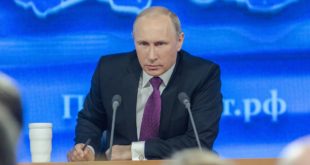The Ukrainian crisis has sparked friction between the United States and Russia that has led to talks of a pseudo-Cold War revival. Though somewhat of an exaggeration the Cold War’s end is pivotal to this friction, namely the year 1990, when Mikhail Gorbachev negotiated the terms of German reunification with US President George Bush (sr.) and West Germany’s chancellor Helmut Kohl. In 2009 official transcripts of dialogues dug up from Western archives – dialogues between US Secretary of State James Baker, Germany’s Foreign Minister Hans-Dietrich Genscher and his Soviet counterpart Eduard Shevardnadze – show the West had promised with certainty to Gorbachev one of his terms, i.e. that “NATO will not expand to the East”. Now, Russians incriminating the US of a broken promise – NATO expanded its membership to 12 ex-Soviet countries since 1990 – are dismissed by most Americans, who, playing the whole thing down, stress that in fact no written agreement was ever drawn up. Unsurprisingly, the debate is at an endless standstill, but instead of unravelling the semantic ambiguities of the term “promise”, history can be much more enlightening. The springboard that led to this impasse was 1990, but a deeper dive into 1949, the year NATO was founded, leads to the crucial but neglected question: why was NATO created in the first place? Simple, the US, Canada and various Western European states needed an organisation to provide security against the USSR. Precisely. So after its dismantling it would appear that NATO has outlived its specific purpose. Let us see why. In 1999, an American retired diplomat aged 95, known in his lifetime as “the man who knows Russia best” said NATO expansion to Eastern Europe was a “tragic mistake”; his name was George Kennan, the same who in 1946, as a US diplomat in Moscow, devised the strategy of ‘containment’ as a way for the US to counter the Soviet threat posed by Stalin’s brutal regime. But post-Cold War Russia, as Kennan himself correctly assessed, far from being a Soviet regime, is even further from being a Stalinist regime. By pushing NATO on its borders, the US affords Russia the same treatment today as to 1940’s USSR, which will yield nothing if not animosity and provocative reactions (read ‘Crimea annexation’), an easily avoidable consequence. However authoritarian his personality may be, no one can maintain that Putin is comparable to Stalin in terms of brutality or even international sway. Hence, whatever may be lacking in US foreign policy towards Russia, Henry Kissinger (certainly not enamoured of Russia as Kennan was) in March 2014 provided a great starting point when he wrote that “the demonization of Vladimir Putin is not a policy; it is an alibi for the absence of one”.






